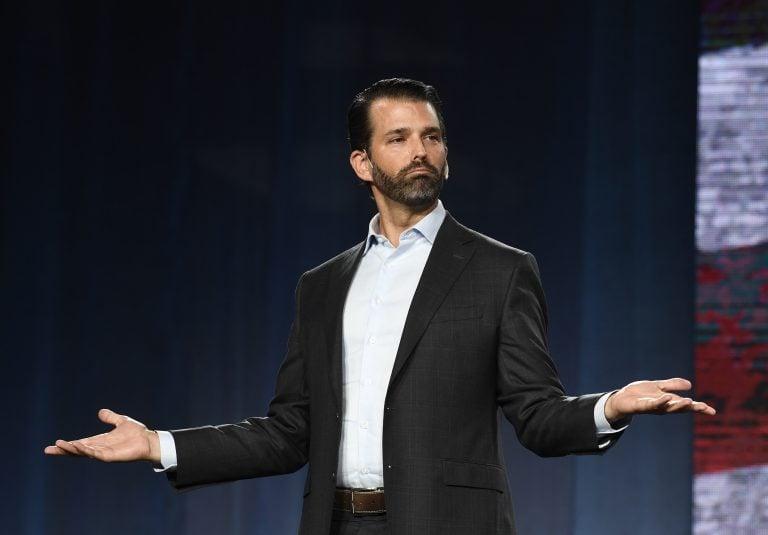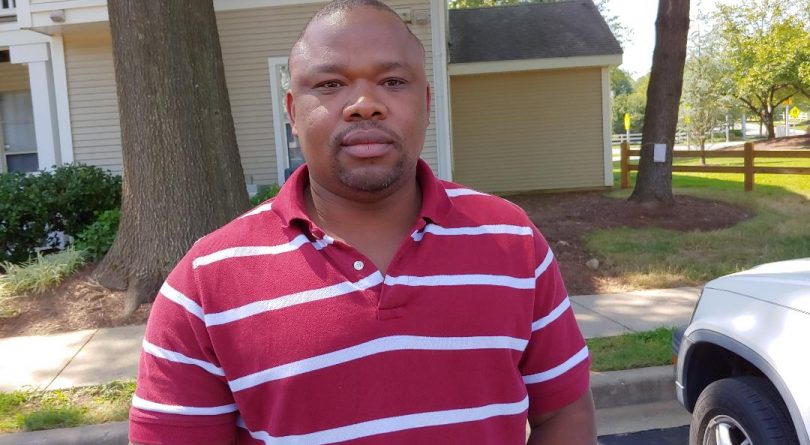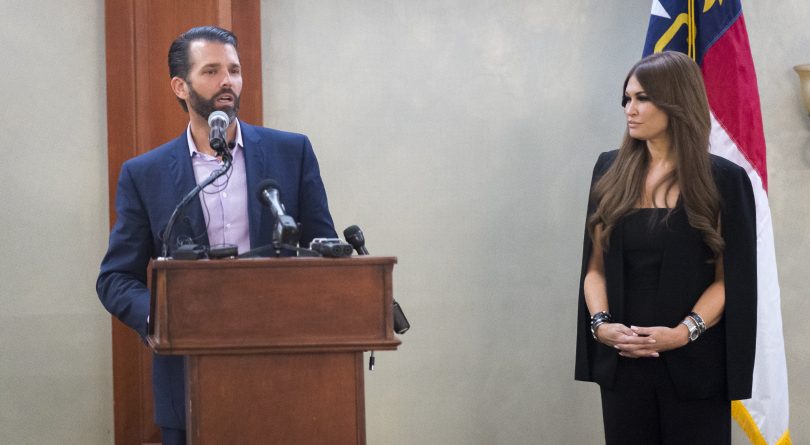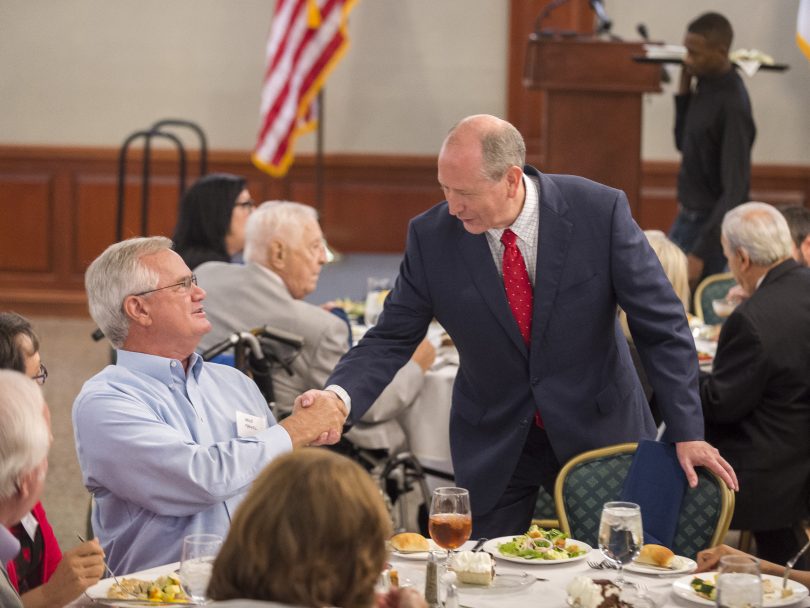Signs of a Republican meltdown in the heart of the U.S. Bible Belt
Former G.O.P. strongholds like the Ninth District of North Carolina are increasingly in play thanks to Trump’s toxic politics, boding ill for the party in 2020

Many Trump supporters imagine a Trump presidential dynasty, with Donald Jr. (above) or his sister Ivanka next in line. But would there be a G.O.P. left for them to lead? (Andy Cross/Denver Post/Getty)
Share
Atsu Mable—it rhymes with “wobbly”—was taking a walk around his townhouse in Germantown, Md. back in April and wearing his favourite baseball cap—the red one with the white letters. Mable, who is one of the very few unemployed persons in the United States during this boomtime first term of Donald J. Trump, is a strong supporter of the 45th president despite his failure to put his MBA in accountancy to productive use. He was passing his days at the Montgomery County library, perusing the job boards while Mrs. Mable brought home the bacon.
A legal immigrant from the narrow and nepotistic West African country of Togo and now an American citizen, Mable especially concurs with Trump’s characterization of his home continent as a slough of excrement, exclaiming, “He is right! Togo is a sh–hole! Africa is a sh–hole! Baltimore is a sh–hole, too! You have to recognize a problem before you can solve it.”
“Right now, Trump is a genius,” Atsu Mable says. “I like the entirety that he does. Like, I came right here legally. Why can’t all people come right here legally then? I went via the proper manner, the proper channels and I’m right here, so why can’t they do the equal aspect?”
About that cap. The white letters spelled out MAKE AMERICA GREAT AGAIN, of course, and that’s what led to all the trouble. Mable had just crossed his community parking lot when two African-American men approached him and voiced their strong disapprobation of his millinery tastes.
“They were asking me, ‘Hey bro, why did you put that hat on?’” he testified in television interviews. “And I didn’t say anything. All of a sudden, I got a punch on my head. Boom! They felt like a black guy have to not be wearing a Trump hat because it’s like whilst you are black, you have to be a Democrat. But Trump continues to be in strength and in 2020 we can win once more.”
“I was on Fox News!” Atsu Mable is boasting now, live and in person. It is late summer and one of the men who pummeled him has been sentenced in Montgomery County District Court to 18 months in prison for assault—the other is awaiting trial—and Mable has returned to the scene of the crime.
“I thought I was going to die, but I’m alive,” he states. “I don’t have a job, but I’m alive. Hillary Clinton said, ‘Attack them wherever you see them,’ so they did. It was like when Sarah Huckabee Sanders was attacked in that restaurant in Virginia. There is a spirit of violence in the country because of Trump. But I am a Christian believer. I forgive them.”

Like Togo—which is rated as “Partly Free” by Freedom House—Montgomery County, Md. is a one-party state. The county sprawls from Chevy Chase (average annual household income: US$420,000) on the Washington, D.C. border to a cluster of heavily Hispanic exurbs to rolling farmland where a few deplorables still cling, in Barack Obama’s words, to guns and religion. But not a single Republican sits on the county council, on the school board, or on any elected town or city administrative body.
More than one million people live in Montgomery County. Only 45 per cent are non-Hispanic white, and about 30 per cent of the county’s adults over the age of 25 hold postgraduate degrees, producing an extraordinary convergence of diversity, education, and liberalism. All three of the county’s members of the House of Representatives are Democrats, as are Maryland’s two U.S. Senators. It has been 41 years since a Republican served as county executive and 13 since a Republican served on the council.
Given current demographic trends—Germantown and neighbouring communities are a prime destination for the Central Americans who caravan across the U.S.-Mexican border—no Republican ever will win an election in Montgomery County again. If you seek the future of the Grand Old Party in a majority-minority post-Trump America, the view from Germantown, Md. is extinction.
“We are the silent majority,” Atsu Mable says wishfully. “But people are afraid to say it. Myself, I do not talk very much.”
“What is the future of the Republican Party after Donald Trump?” he is asked.
“Donald Trump, Junior!” Mable cries.

Donald Trump Jr. is standing at a podium at the Rolling Hills Country Club in Monroe, N.C. with his companion, the former California prosecutor, Victoria’s Secret model and Fox News anchor Kimberly Guilfoyle at his flank.
The other side is motivated by nothing but hate,” Junior is saying—while simultaneously excoriating “the Hamas wing of the Democratic Party”—“but hate is a powerful motivator.”
You may recall that, during the second of the three presidential debates of 2016, Secretary Clinton was asked by a member of the audience to “name one positive thing that you respect in one another” and her answer was “Look, I respect his children. His children are incredibly able and devoted, and I think that says a lot about Donald.”
Now here is Donald, Jr. devotedly tweeting “Has Joe Biden met a segregationist yet that he doesn’t have a great deal of affection for?” and promoting his forthcoming manifesto, Triggered: How the Left Thrives on Hate and Wants to Silence Us.
RELATED: Trump says Republicans are ‘unbeatable’ after Senate passes tax bill
“My father doesn’t need this job—he’s doing it for Mother Russia?” the president’s eldest of three sons jibes. “He could have done nothing and had a pretty good life—but the words my father said to me when we’re getting in that elevator—he looked at me and said, ‘Now we find out who our real friends are.’”
“If there’s one thing that my father has been able to show—conservatives who have been masters at snatching defeat from the jaws of victory, or not being willing to engage, we’ve shown that you don’t have to do that—for the first time in history you have a president who’s actually delivering on the promises made on the campaign trail—that is the anomaly —that is unusual—he gets hell for doing all the things he told you he would do.”
“He’s a lot more like his father than he thought,” Guilfoyle cracks, waxing archly on her boyfriend’s rilesome tweets. “The base gets him. He loves them and they love him.”
Monroe is the seat of Union County, and Union County—located just to the east of Charlotte, where Trump Sr. will be nominated for a second term next August—also is a one-party state. But down here, that means Republican.
Union County is 79 per cent white and once was a bastion of the Ku Klux Klan. Monroe’s best-known native son was Jesse Helms, the hard-right Republican senator who served five terms in Washington, D.C. It has been 57 years since a Democrat was elected to Congress from the Ninth District. There are zero Democrats on the Union County board of commissioners. Seventeen years ago, a Republican named Eddie Cathey became the first Republican ever to be elected sheriff of Union County. He’s still there.
But, but, but. Last fall, the election for Congress in the supposedly-safe Ninth district—a riding that Donald Trump won by 11 percentage points in 2016—finished in a virtual tie before the result was thrown out when it was revealed that a Republican operative had pre-filled absentee ballots and handed them around for trusting seniors to autograph and submit. A do-over is scheduled for Sept. 10. In late August, polls showed a dead heat. Hence the spending of millions of dollars for television attack ads by both sides, and the rally by the younger Trump and the exuberant Guilfoyle at Rolling Hills.
If the Democrats can convert enough disgusted Republicans to win the Ninth District this month after six decades in oblivion—and turn even such lily-whit constituencies as Monroe, N.C. red in the long term—it could drive another nail into the coffin of the two-party system and condemn the Republicans to irrelevancy even smack-dab in the Bible Belt.
“Your candidate’s biography begins with the words ‘Dan Bishop is a Christian,’” a visitor notes to Sheriff Cathey. “What does that say to voters who aren’t Christian?”
“I think that’s Dan’s choice,” Sheriff Cathey replies. “I don’t publish it on a web site, but I’m branded the same way. And if you look at the so-called “new” Democratic Party, they’re out there pushing ideas that nobody wants.”
“You’ve got to remember that you are smack-dab in the middle of the Bible Belt,” says John Steward, the Republican chairman for the Ninth District. “We do have some work to do nationally to diversify the party, but I think we have a winning message. Conservatism wins when properly explained.”

The Republican candidate’s explanation is this: “I represent the values of the Ninth District,” Dan Bishop tells the country-clubbers. “I’m not ashamed of the values of the Ninth District. When I go to Washington, I am going to stand with the president of the United States, Donald Trump.”
“Are the president’s tweets helping or hurting you?” party steward Steward is asked.
“When his unintended slurs come out, it does look like he hurts us,” he answers. “But you have to look at his policies—the low African-American unemployment, the things he’s done for the LGBT community. What he tweets and says gets the headlines, but what he actually does is helping people. I think that people will be surprised in 2020 when they see the vote totals. Demographics are not going to be immediately fatal, but in the long term that could change.”
RELATED: Republicans once led the health care debate. What happened?
“Is Donald Trump Jr. the future of the Republican Party?” Chairman Steward is asked.
“I don’t know about president, but he’s making noise about running for mayor of New York City. And Ivanka will do something in the House of Senate, that’s for sure.”
In the parking lot of the Rolling Hills Country Club is a 2005 Cadillac Escalade, all Trumped out in pro-Donald bumper stickers, including one that shows a donkey wearing a swastika and the legend DEMOCRATIC PARTY—MODERN-DAY NAZI PARTY. The owners of the aged Cadillac—it is the newest of their 10 motor vehicles—are Judy and Edward Price, the latter being rather conspicuous in a pink shirt and a sport coat of pastel brocade.
“I’ve been given the finger, cussed at, and I had a Wendy’s smoothie throwed at me,” Mr. Price complains, describing the cost of his flamboyant pro-Trump partisanship when he ventures outside Union County—he’s the Atsu Mable of the Tar Heel State.

A reporter notes that, of the 200 North Carolinians who paid US$250 and up to hear Donald Trump Jr. speak at Rolling Hills, all but one was white.
“The Democratic Party bought and paid for the blacks in the 1930s,” Price explains.
“Is Donald Trump Jr. the future of the Republican Party?” the Navy veteran is asked.
“I have no problem with the son,” he replies. “But Ivanka comes first. We’re saving Junior for 2028.”
***
Third-year student John Waugh and second-year student Jackson Lohrer are two of the 25 or so members of the College Republican club on the campus of the University of North Carolina at Charlotte. A handful of the other members are young men of colour. Only one of the 25 is female.
“It has been a crazy ride,” Lohrer says in an interview on the Trump years and what will come after them, be it in 2021 or 2025. “If you hold politicians to a higher standard than you hold yourself, you’re going to get burned.”
RELATED: Trump adds another ugly chapter to American history
“Trump continues to amaze us in so many different ways,” says Waugh. “You would think that after he had a successful campaign, he would tone it down a little bit, but he just keeps going further and further on Twitter. In the future, I see us sticking to what President Trump’s been doing—the economy is strong, unemployment is the lowest ever, the party is behind him. The question is, who’s next.”
“Trump runs, then his son runs, then his daughter runs? I don’t like that,” Lohrer says.
“It’s a celebrity’s game now,” he goes on. “Kanye West drops his support and the media goes crazy? This could lead to a potentially dangerous situation.”
The College Republicans do not believe that their party is doomed to oblivion as America’s white majority fades away. Jackson Lohrer notes that “half of the Cubans in America voted for Trump.”
“It’s about foundational values, not race,” he states. “Voting on the basis of race is itself racist.”
Last April, a 22-year-old man who had dropped out of UNCC a few weeks earlier walked into a class in “Science, Technology, & Society” and began to fire a pistol at random. One student was killed and four others were wounded before a student charged and tackled the gunman, giving dozens of others time to get out of the room. The hero was shot in the face and killed before the shooter sat down and calmly said, “I’m done.”
The fact that only a couple of kids died at UNC Charlotte kept the shooting out of the national headlines. “It really is sad that we live in a society now that if 10 or more people weren’t killed, it’s no big deal in the eyes of just the general public,” one of the wounded students told a local newspaper this summer. But now the campus is back in session and a visitor is asking the College Republicans, “Is there a danger in being known as the party of guns and the people who love them?”
RELATED: Why Donald Trump’s dramatic swing on gun control won’t last
“There is. We are,” accepts Jackson Lohrer, who was not in the fatal classroom that day. “But they’re the party of fear.”
“Look at where these shootings are taking place—mostly in gun-free zones,” says John Waugh. (On Labour Day, as this article was being prepared, another UNCC student was shot dead at a campus residence and two female students were wounded.)
“Are you carrying a weapon right now?” a reporter inquires of the two College Republicans, four months after the massacre.
“I would prefer not to answer that question,” one of them responds.
***
In 2017, Thomas A. Schwartz, a presidential historian and Distinguished Professor of History at Vanderbilt University in Nashville, Tenn., contributed to an article entitled “The Future of the Republican Party.” This was only a few weeks after Donald Trump’s inauguration—“the biggest in history,” you will recall—at which one of the volunteer parade marshals was Atsu Mable, the immigrant Togolese.
“My own sense is that Donald Trump may have a profound effect on the Republican Party, as profound as Ronald Reagan,” Schwartz wrote then. “But the key point is that he must be successful in order to have this effect. By success I would argue that he has to increase America’s relative economic growth rate to close to four percent, avoid messy and inconclusive wars, and keep from any embarrassing scandals.”
“I don’t think my prediction was terribly risky,” the professor says now in an interview, looking further ahead. “I don’t think that demographics are destiny. Trump’s base, by most stretches of the imagination, should be declining. But I think people put too much into demographics—demographics are important, but what is more important is success—or at least the impression of success. But in the event of a Trump defeat in 2020, all bets are off, just as the Democrats are reflecting that now in the wake of Hillary’s defeat.”
Pat McCrory, the former Republican governor of North Carolina, also does not see his party’s extinction as inevitable, even though a slim majority of millennials now claims to prefer socialism over capitalism.
“I predict that will change as they get married and start having further responsibilities beyond themselves,” McCrory tells Maclean’s. “I think you’ll also see changes within the Latino community and some members of the African-American community. African-Americans tend to be more conservative on social issues, and as the Latino community becomes more prosperous, it will become more fiscally conservative. And I think that future generations will be insulted by being classified by race and sexual orientation—they want to be considered as individuals.”
“One thing the Democrats have been very successful in doing—they say Trump is great at branding—the Democrats have been very good at trying to define the president as a racist and a nationalist. Throwing around the term ‘white supremacist’ is a tremendous mistake—a mistake politically and a mistake for our country. When you’re debating somebody and they start cussing and calling you names, you’ve already won.”
“I think Trump and Obama are very much alike—they have a core base that will accept any change in policy because they so much believe in the individual. They both ignored the structure of their party to win the election. Obama was a role model for Trump.”
“Who is Trump a role model for?” Gov. McCrory is asked.
“I don’t know yet but the party structure is extinct,” he answers. “The president and the governor are free agents—the candidates control the party as opposed to the party controlling the candidate.”
***
Labour Day workforce update—Atsu Mable has found a job!
“Donald Jr., Eric, Ivanka, and Jared Kushner all will run in the primary, so one of them has to win!” enthuses Atsu Mable back in Germantown, Md. But his view of presidential succession may be clouded by the recent history of his native country, whose president died of a heart attack in 2005 and who was succeeded by his son, “raising many eyebrows,” as one commentator noted. The scion remains implacably and illegally in power.
“Eight more years!” mewl the faithful at Trump rallies. “If things keep going like they’re going,” the president joshed at a hootenanny in Pennsylvania, “we’ll go and we’ll do what we have to do. We’ll do a three and a four and a five.”
RELATED: Why ‘shadow president’ Mike Pence badly wants the Oval Office
Few serious Republican stalwarts believe in the dawning of a Trump dynasty. Thomas Schwartz, the historian, suggests that George P. Bush, the bilingual, half-Hispanic son of former Florida governor (and failed, “low-energy” Trump challenger) Jeb, might qualify as a comer. Pat McCrory predicts that Nikki Haley, the former governor of South Carolina and Trump’s first ambassador to the United Nations, could be the party’s frontrunner by mid-decade.
“What about Mike Pence?” one asks of Atsu Mable.
“He don’t talk that much,” he responds.
Out in California, Ronald Reagan’s once-reliable Orange County has flipped, electing only Democrats to Congress in 2018 and making Republicans a minority of registered voters. In nearly every “swing state” that Donald Trump carried in 2016, recent polls show him behind a Democrat—any Democrat—by a dozen points or more. “I understand that my slice of the Republican Party is about an inch thick,” sighs the discarded moderate Mitt Romney, the party’s presidential candidate in 2012 and now a back-bench senator from Utah.
In Montgomery County, Md., the vastly-outnumbered coterie of registered Republican voters received a mailing in August from an entity that calls itself the “American Immigration Control Foundation.”
“By 2020,” the flyer warned, “non-white children will be more than 50 percent of the population under 18 years old; by 2044, non-Hispanic whites will be less than 50 percent, says the Census Bureau” (emphasis theirs).
Such is the dystopian forecast of the party of white folks, Jesus, and automatic rifles; the party of Lincoln; the party of Trump.
The faculty advisor for the UNCC College Republicans is a lecturer in the Department of Political Science named Mary Jo Shepherd.
“As a political scientist who came of age in the era of Ronald Reagan,” she says on Charlotte’s bloodstained campus, “I kept hearing Republicans say, ‘We need the next Reagan. We need the next Reagan.’ I would always say, ‘No. We need to focus on conservative principles.’ Today, we’ve got to get past the point where people are asking, ‘Who’s the next Trump’”
“Do you really believe you will?” Shepherd is asked.
“No,” she responds. “It just seems like whoever can market himself the best wins.”
“So who’s the next Trump?”
“I have no idea.”
Correction, Sept. 7, 2019: The original version of this story said Republicans hold all of the seats on Monroe City Council; in fact, it is the Union County board of commissioners that is entirely Republican